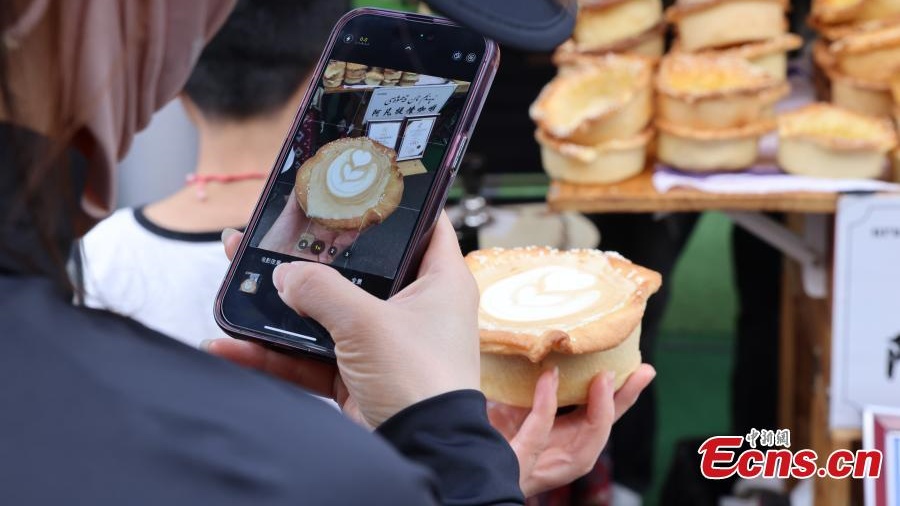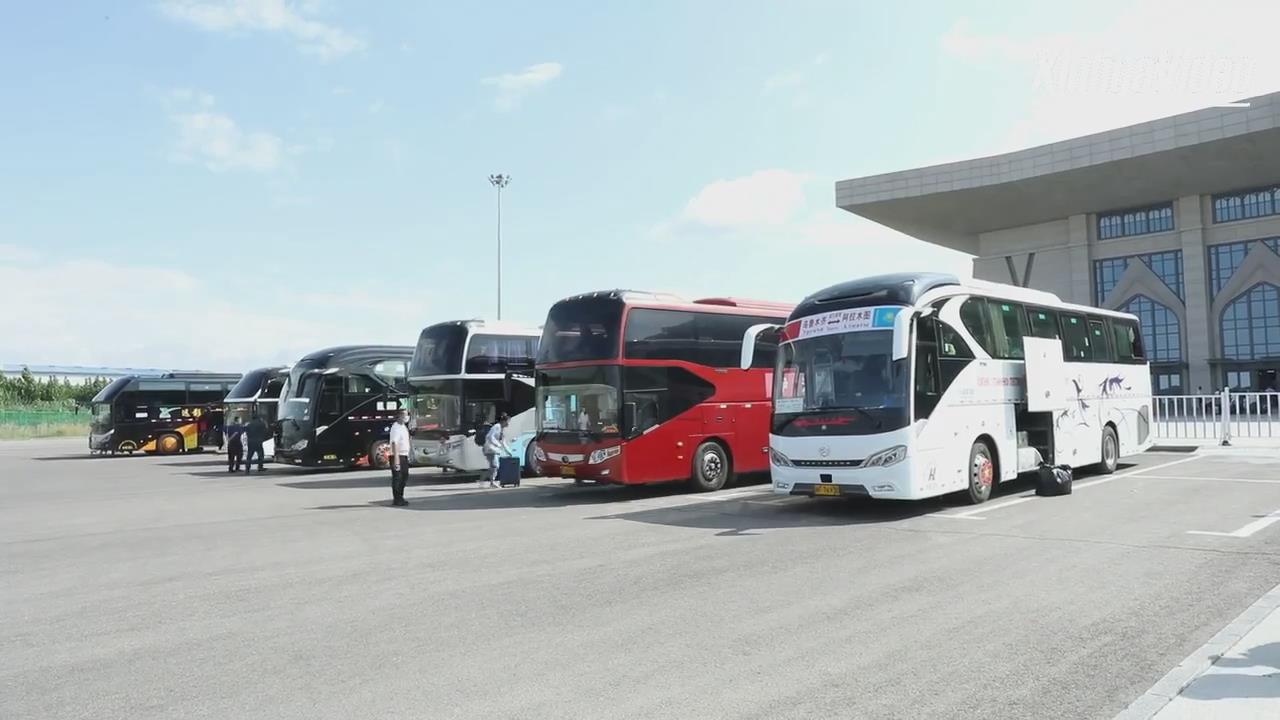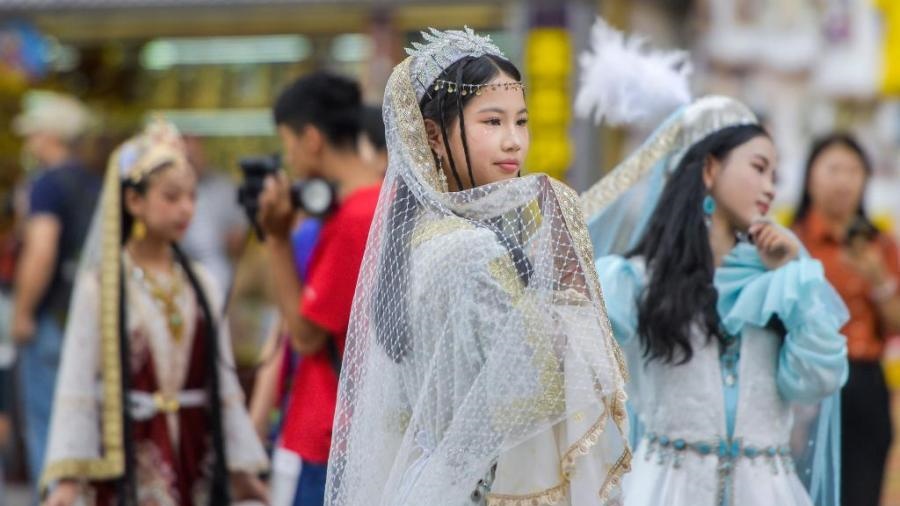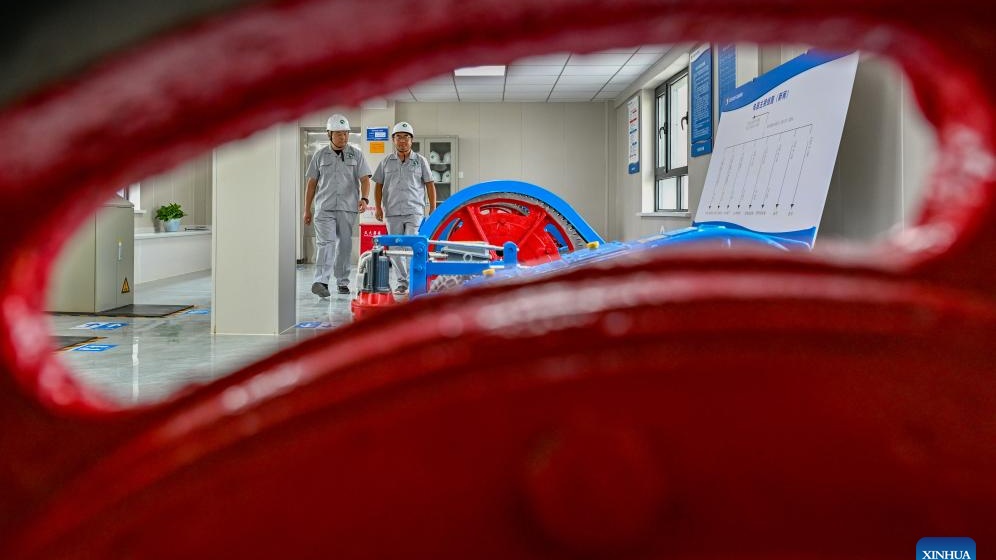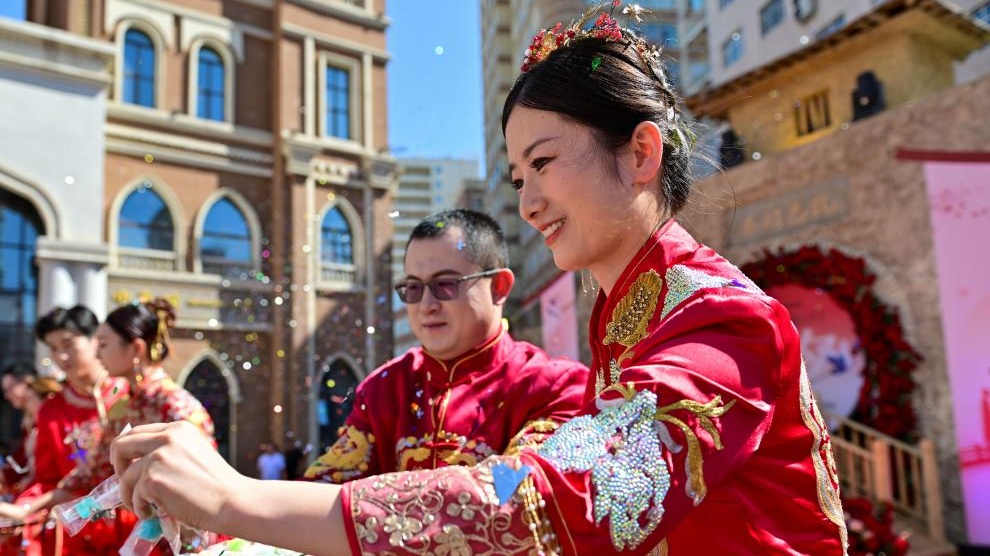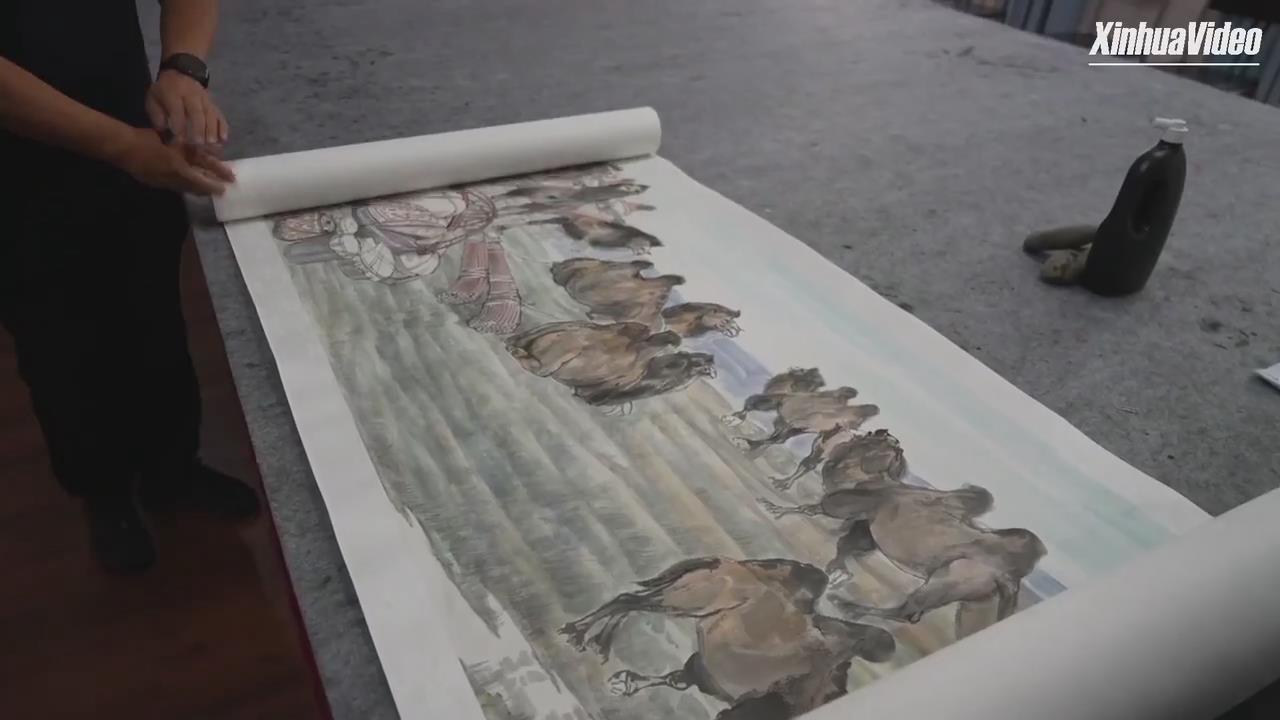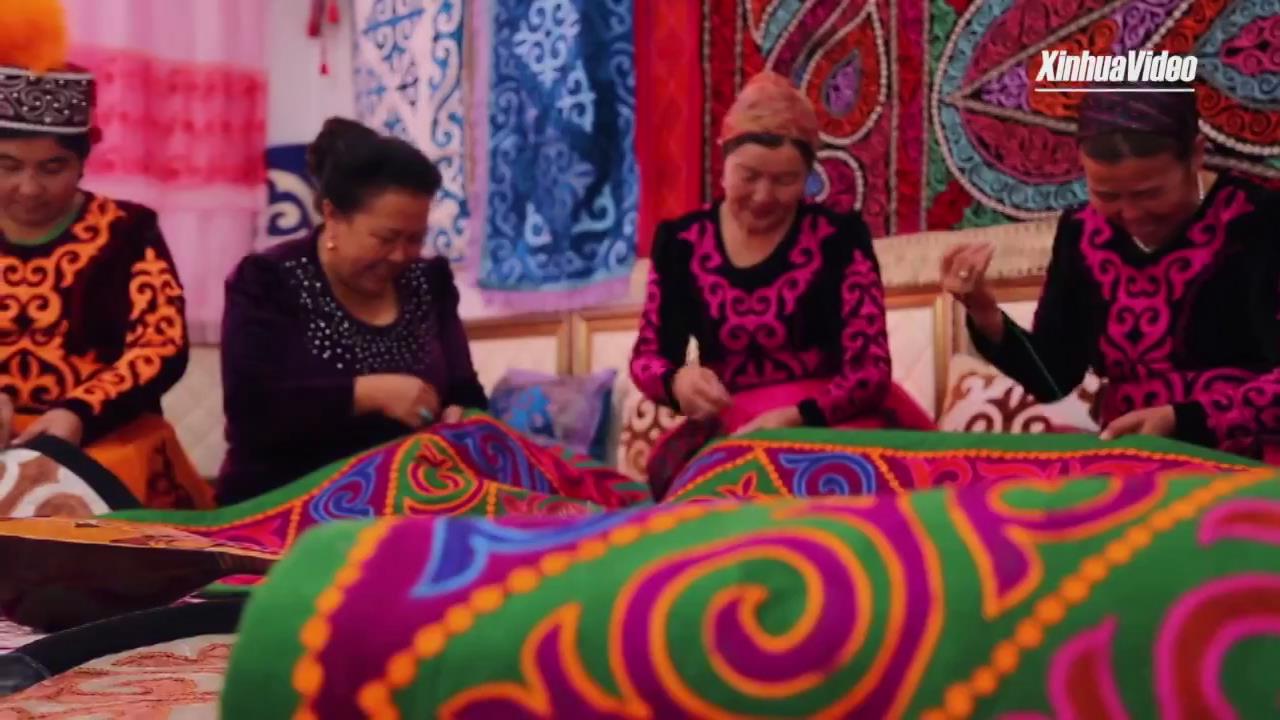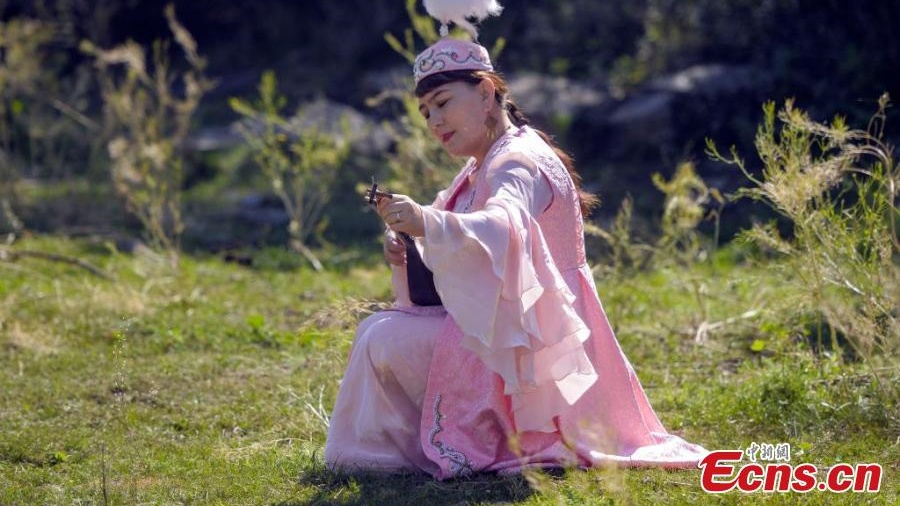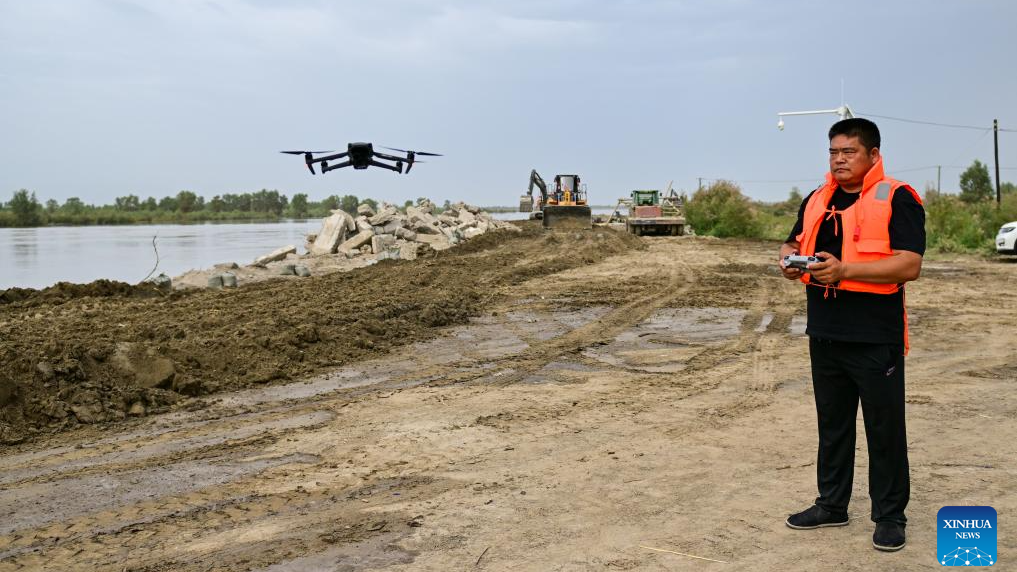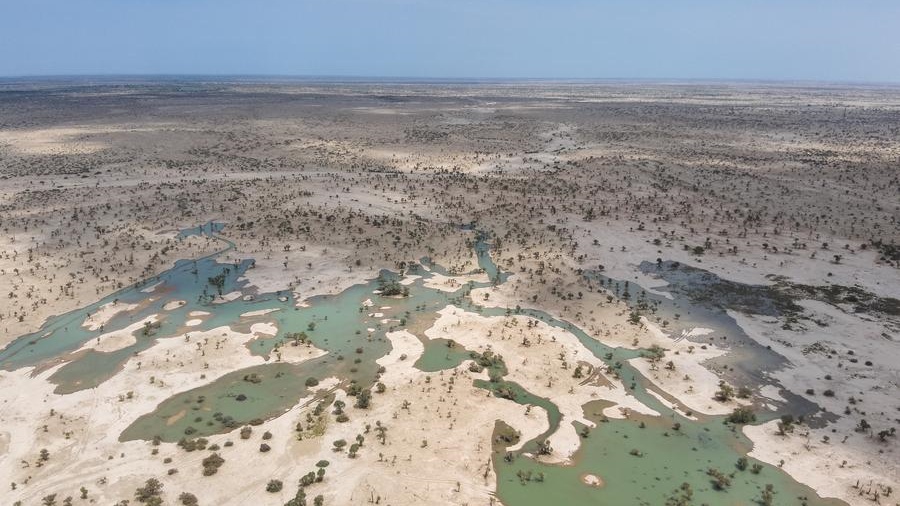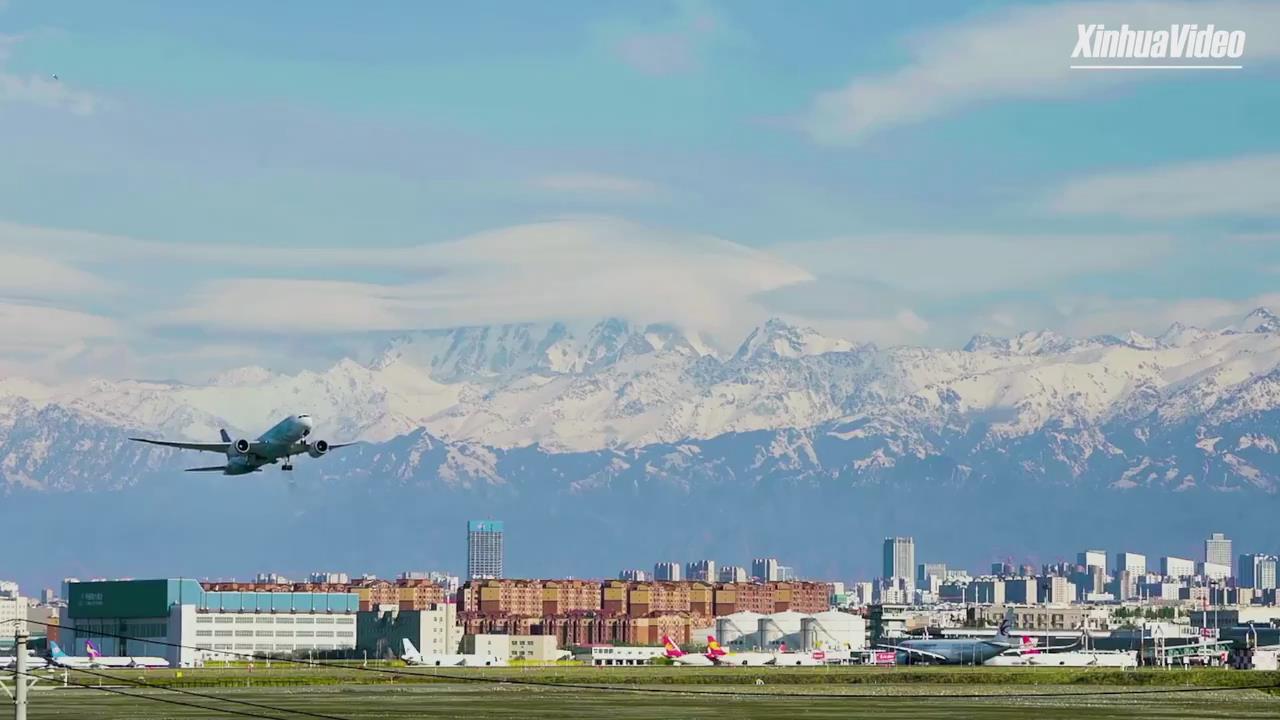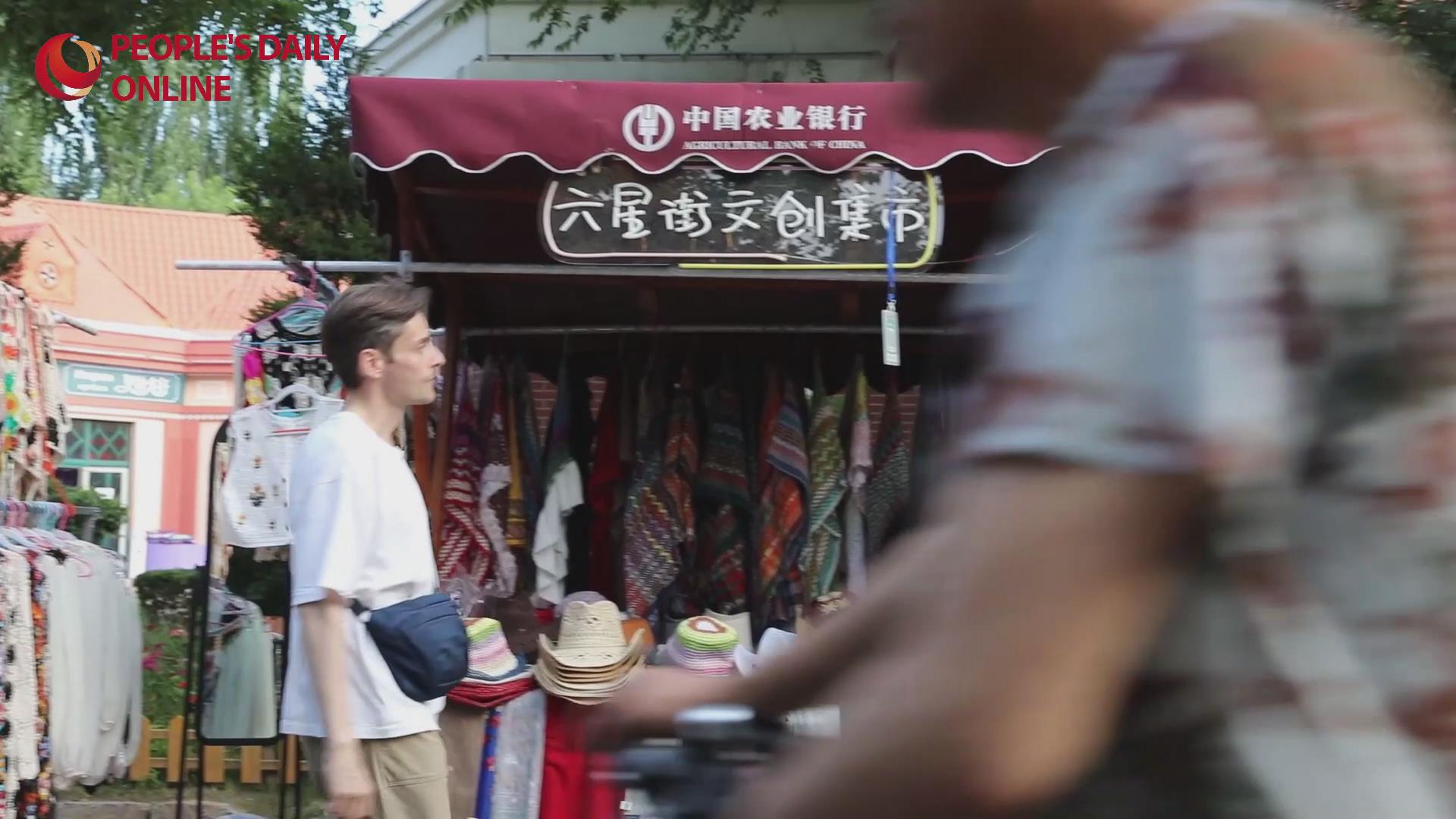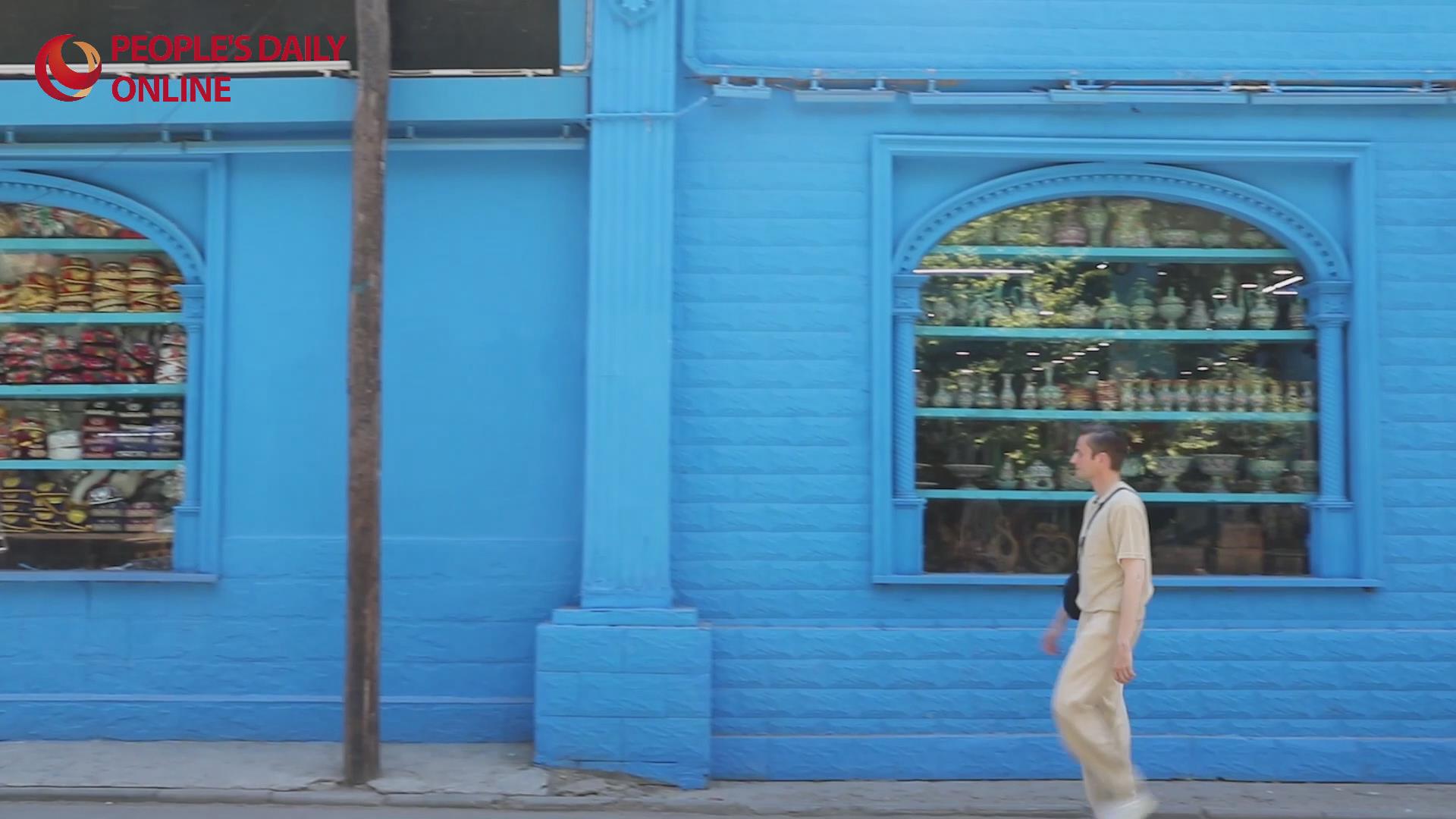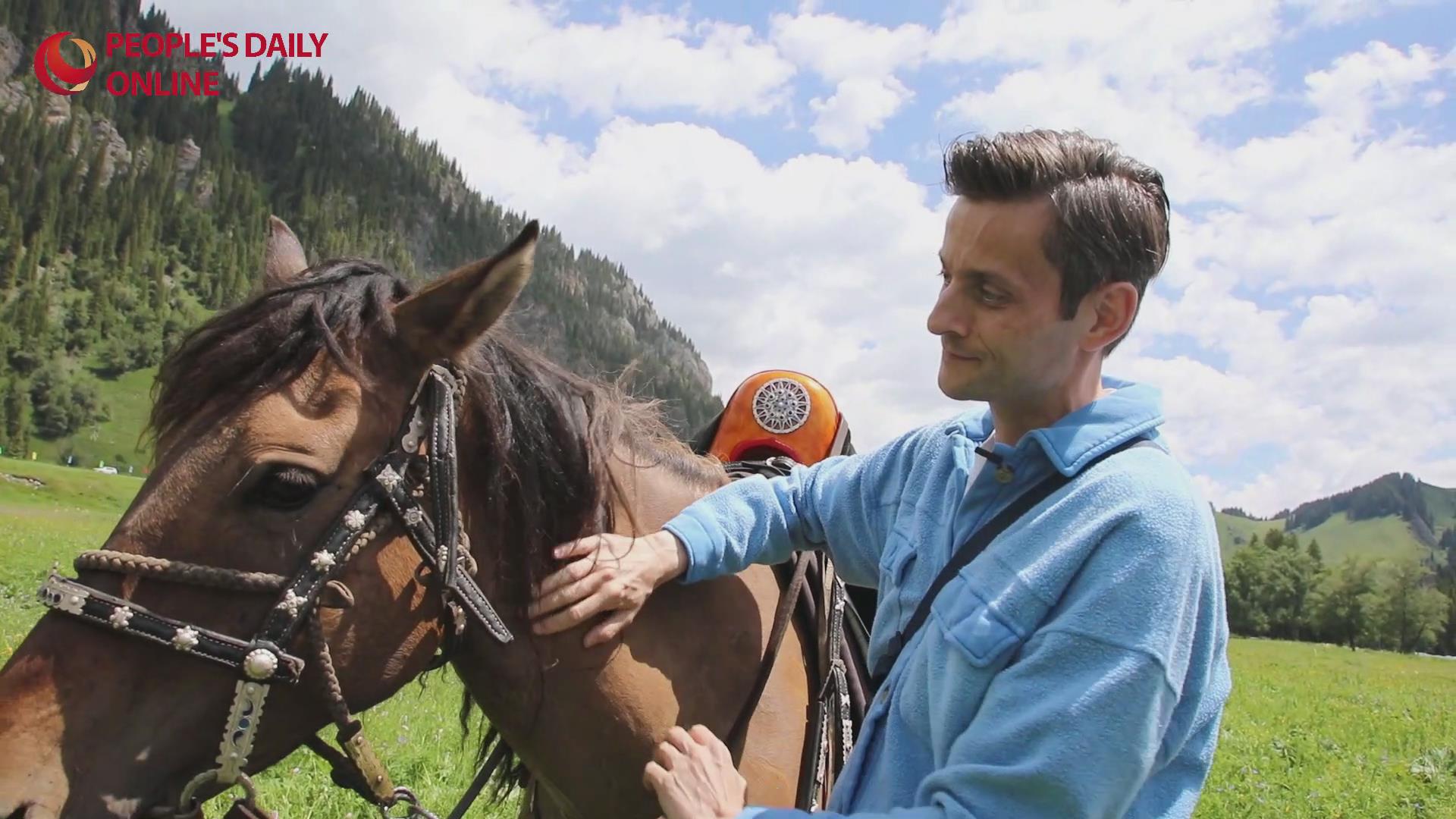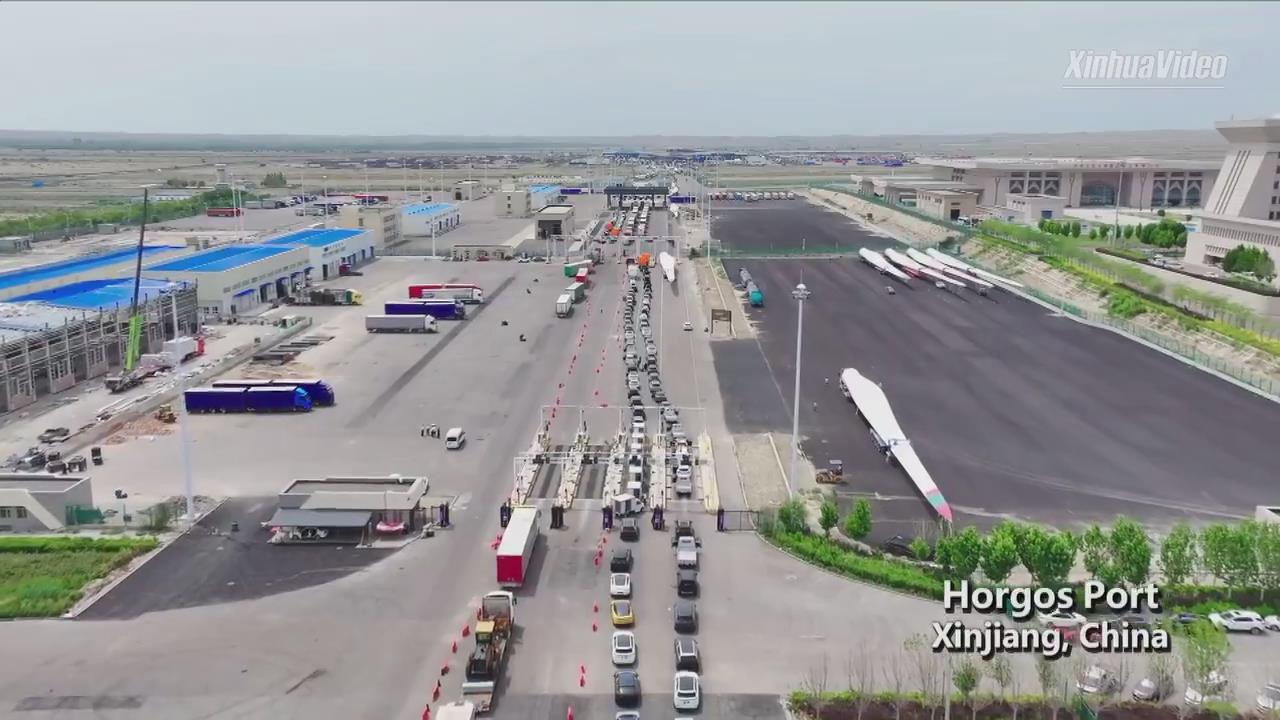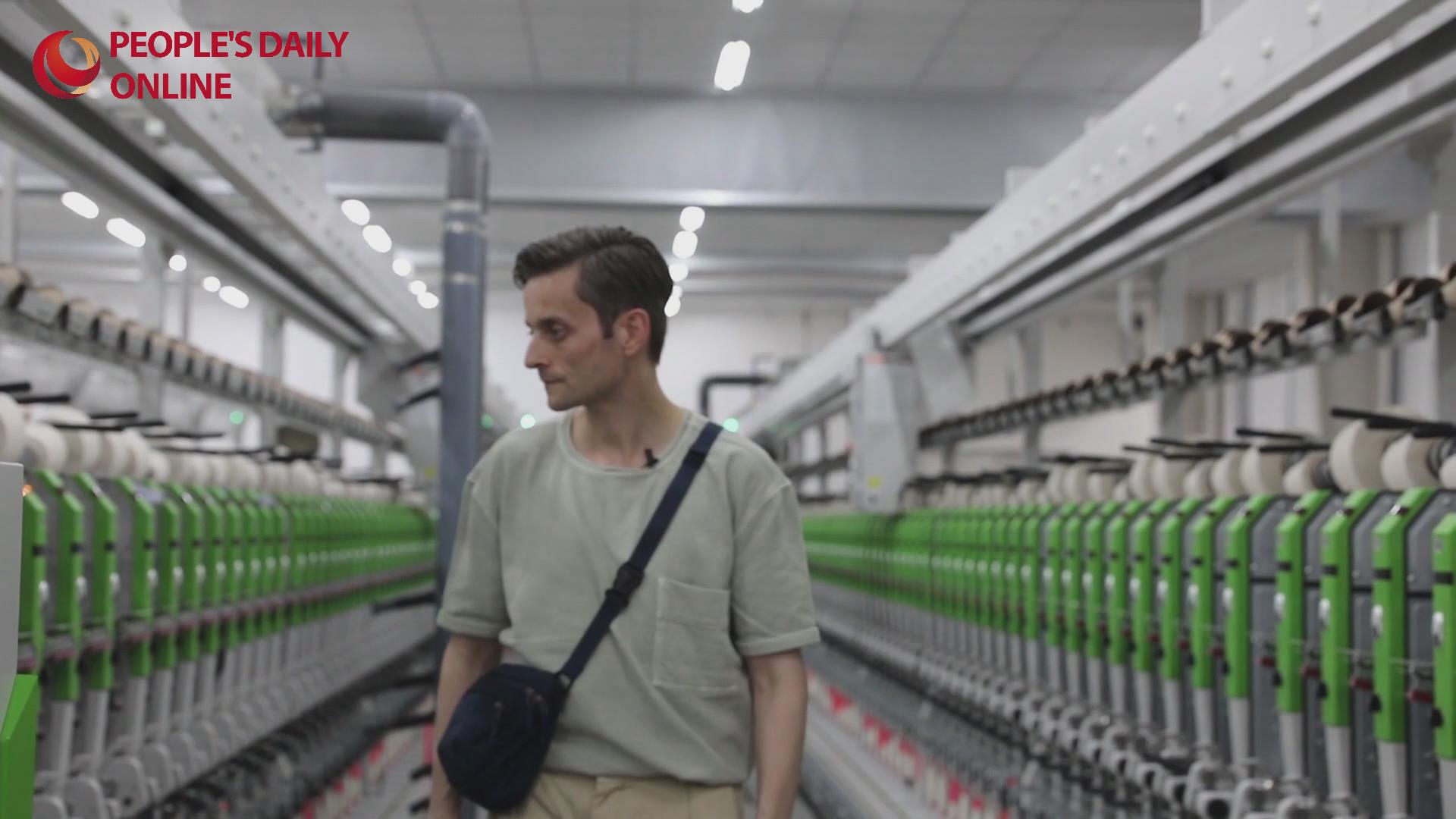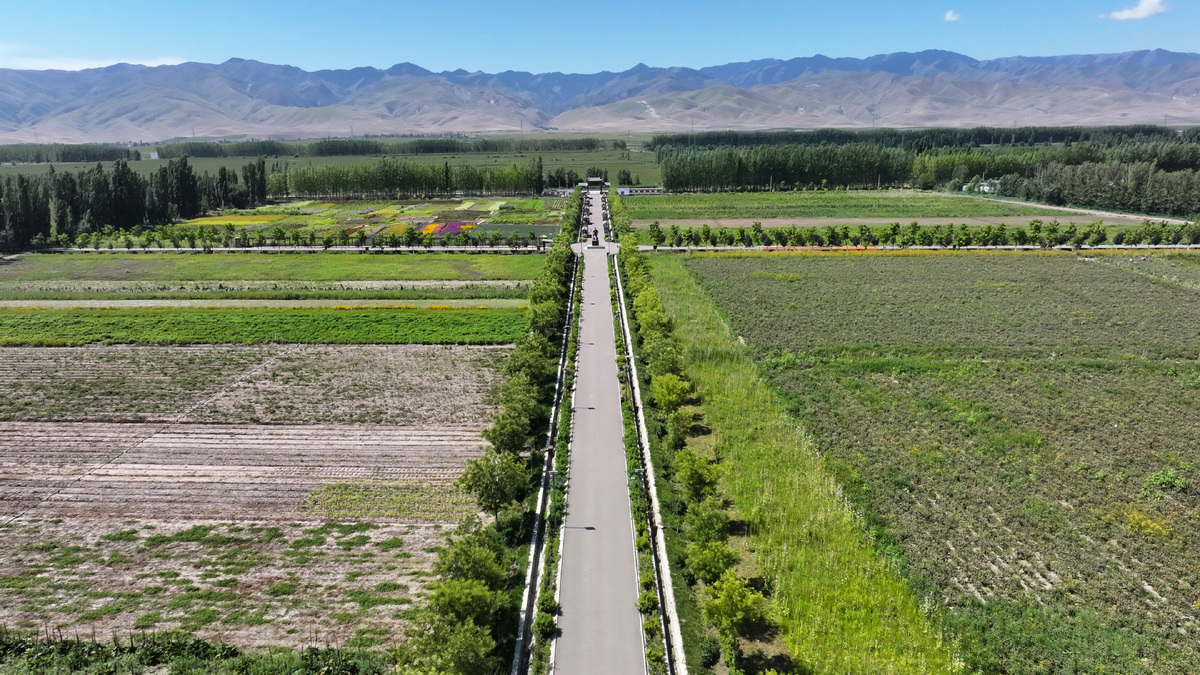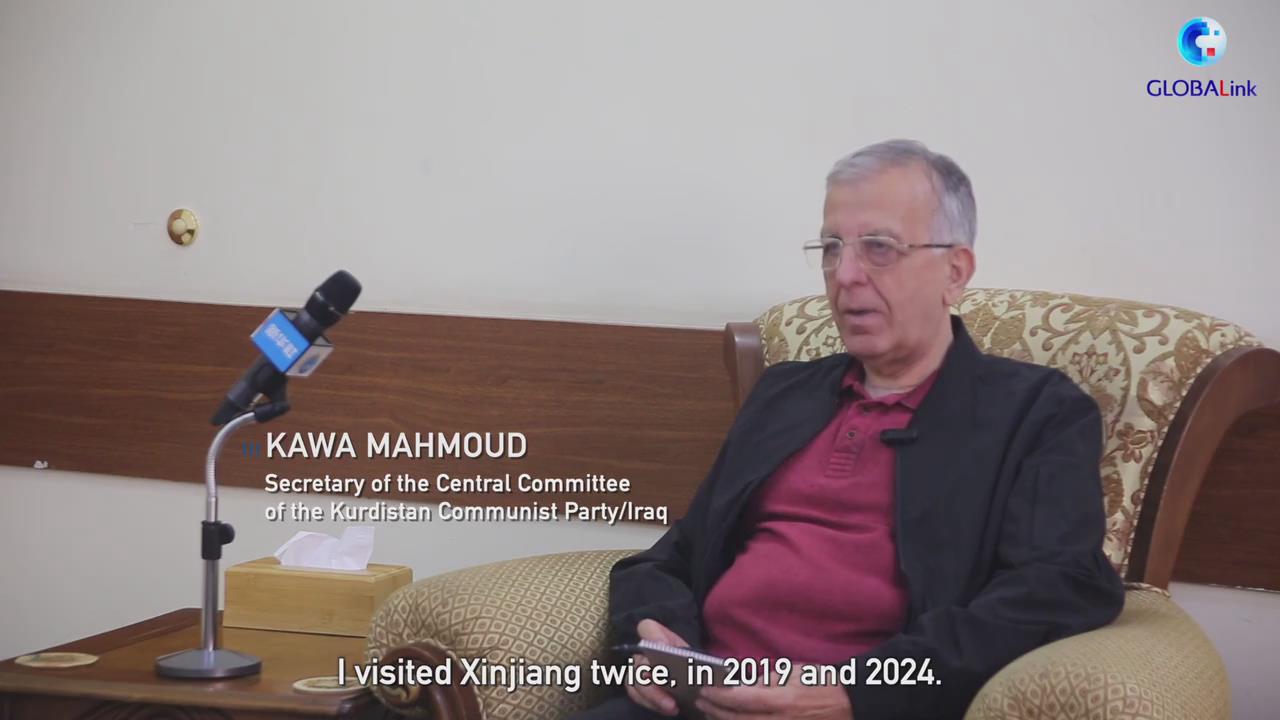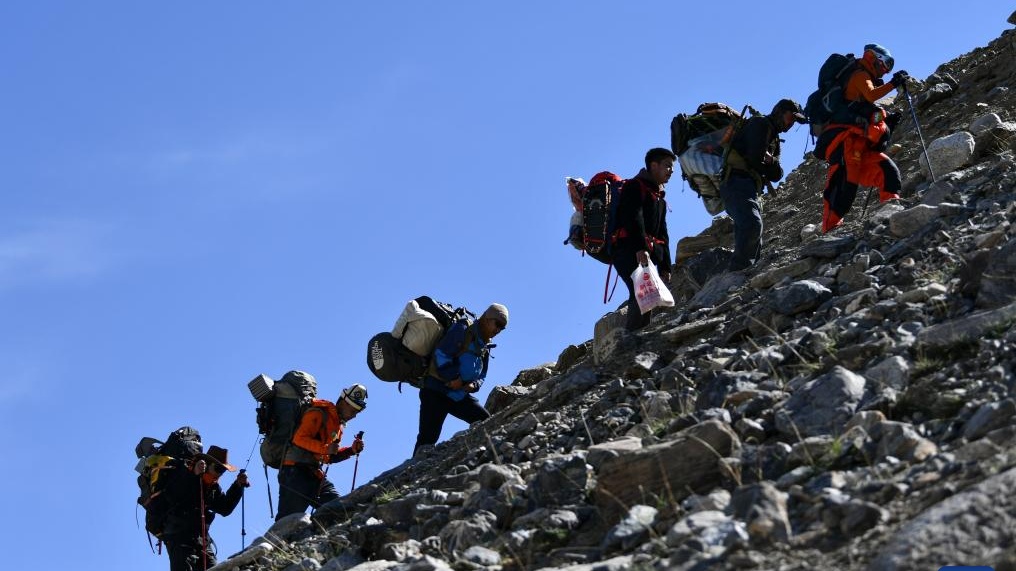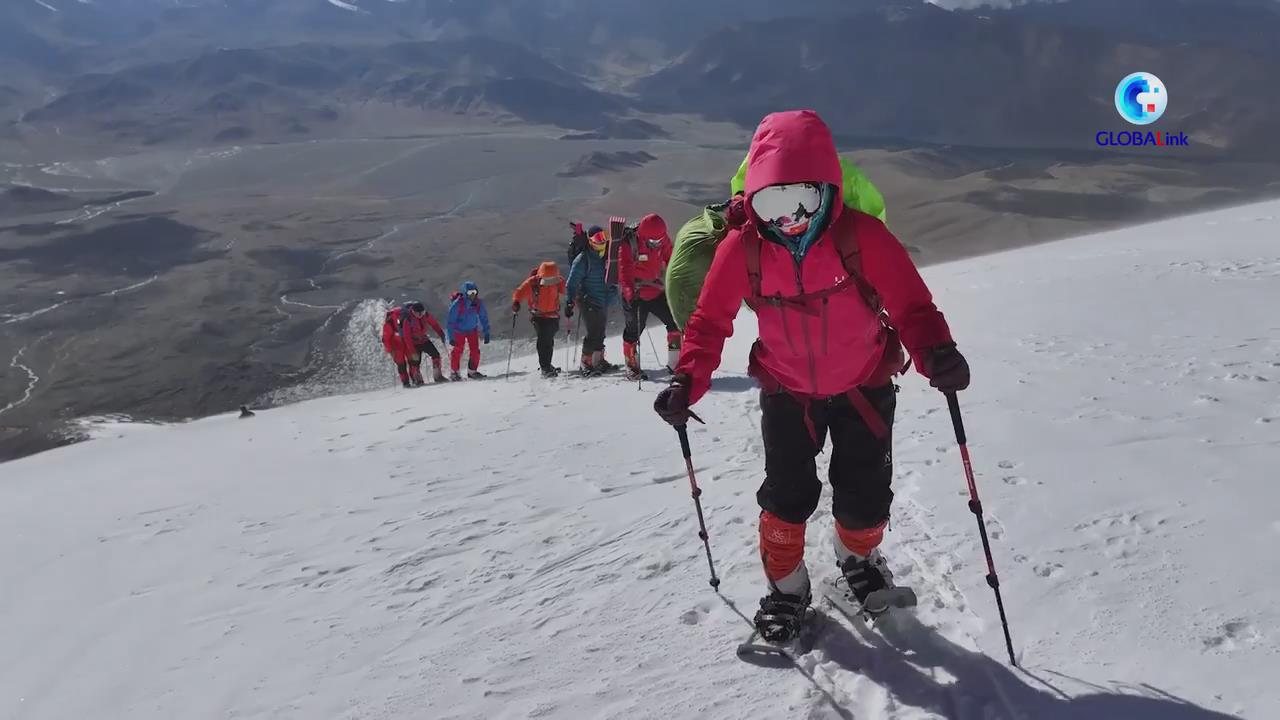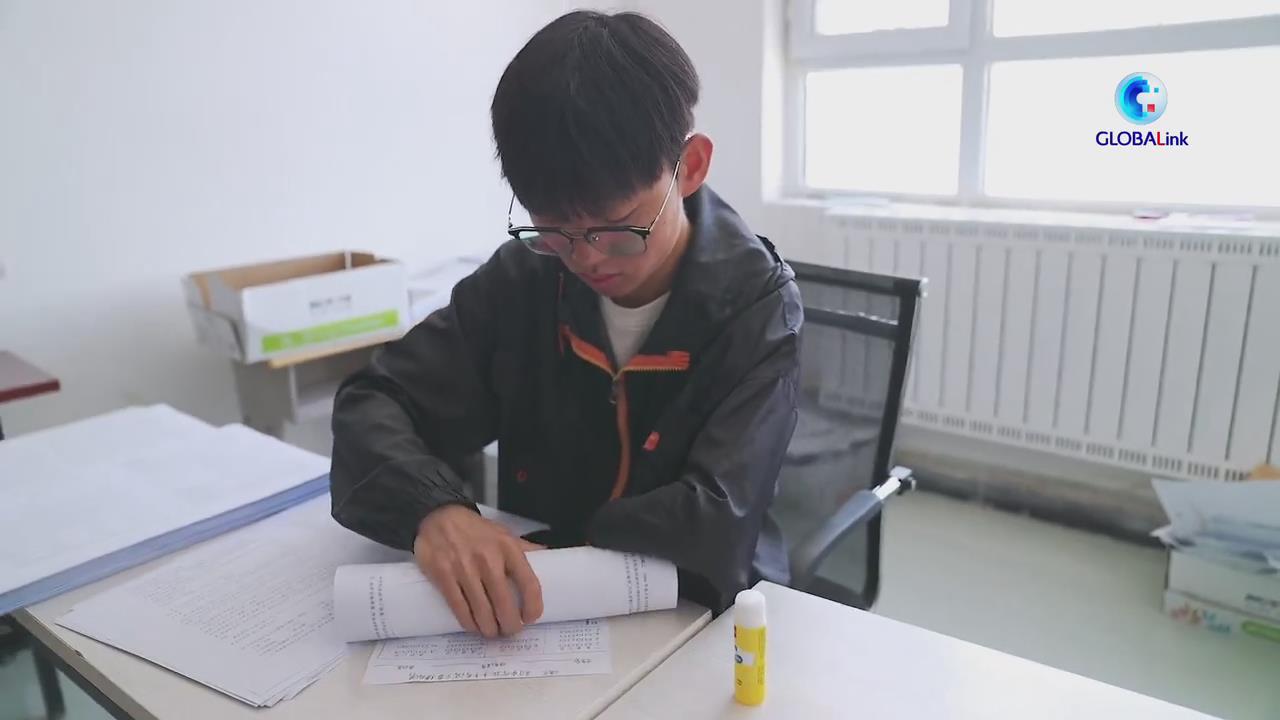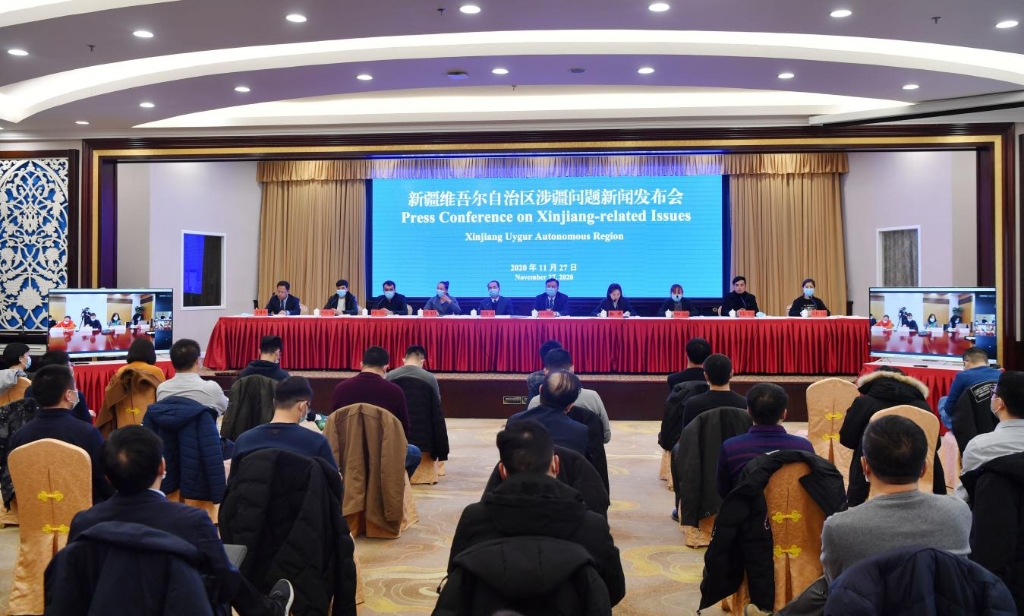
Photo taken on November 27, 2020 shows the 19th Press Conference on Xinjiang-related Issues held in Urumqi, capital of northwest China’s Xinjiang Uygur Autonomous Region. Photo by Zhou Peng of Xinjiang Daily
Xu Guixiang: Dear friends from the press, good afternoon. Welcome to the press conference on Xinjiang-related issues.
Today, we are very happy to have the Spokesperson of the Information Office of the People’s Government of XUAR Elijan Anayit, the Director of the Health Commission of XUAR Mutalif Roz, as well as the former trainee of the vocational education and training center in Hotan County of Hotan Prefecture Mukerem Memet, the former trainee of the vocational education and training center in Yutian County of Hotan Prefecture Amina Mattursun, the former trainee of the vocational education and training center in Hotan County of Hotan Prefecture Ablikim Dawut, the former trainee of the vocational education and training center in Moyu County of Hotan Prefecture Shirali Amarjan, the former trainee of the vocational education and training center in Shanshan County of Turpan City Aysham Rasul, the former trainee of the vocational education and training center in Wensu County of Aksu Prefecture Ablajan Ablat, to be present at the press conference. We would like to invite them to answer questions from you.
Also, 4 foreign media based in Beijing will participate in today's press conference, namely CNN of the United States, KBS of South Korea, Rossia Sygodnya of Russia and 24kz Television of Kazakhstan, who will interact with us through video connections.
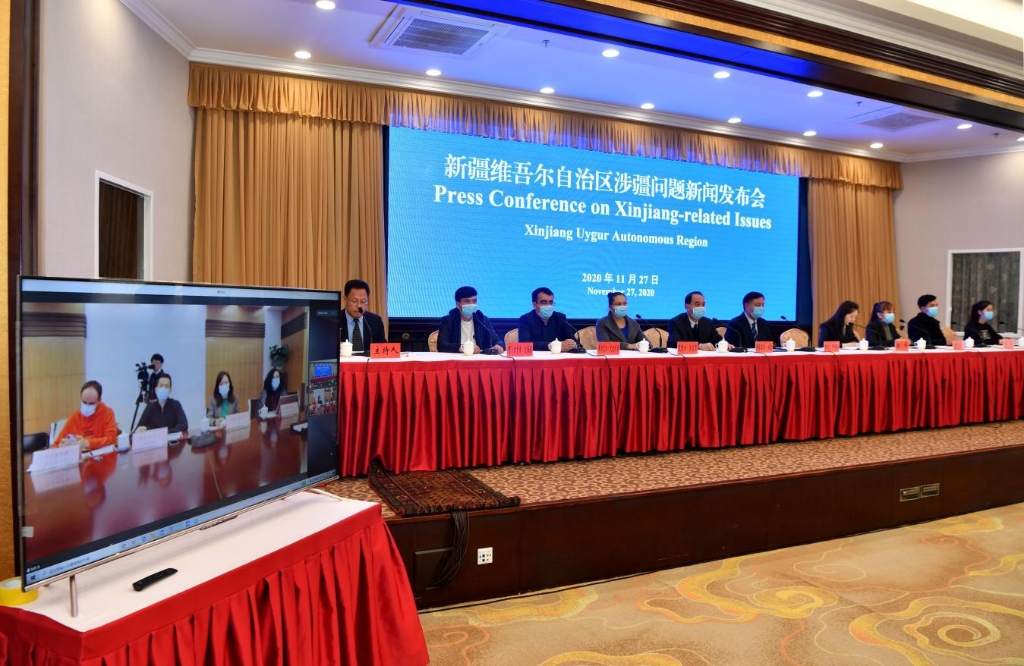
Photo taken on November 27, 2020 shows the host, the Spokesperson, the director of the Health Commission, former trainees of the vocational education and training center as well as reporters from the foreign media based in Beijing via video connections present at the 19th Press Conference on Xinjiang-related Issues held in Urumqi, capital of northwest China’s Xinjiang Uygur Autonomous Region. Photo by Zhou Peng of Xinjiang Daily
To show our welcome, we first invite friends from foreign media to ask questions.
CNN: Thank you, the host. I am a reporter from CNN of the US. I have 3 questions. I will ask several people on the stage.
The first question is for the Spokesperson of the Information Office. Some overseas think tanks deduced based on satellite images that Xinjiang has kept constructing buildings similar to "detention facilities" that allegedly could be used for "forced labor" venues. If all the trainees of the "vocational education and training centers" had already graduated as claimed by government officials, what are the purposes of those buildings? US president-elect Joe Biden said that China’s policy for Xinjiang is the same as"genocide". What is your comment on this?
The second question is for the Health Commission. Counter-epidemic measures taken by Xinjiang amid COVID-19 outbreak seem to be stricter than other parts of China. Is this due to political security considerations, or it there any unique weakness in Xinjiang in the face of the epidemic? What is the proportion like for different ethnic groups among the confirmed cases?Have these strict measures caused more negative effects to Xinjiang's economic and social life than that to other provinces?
The last question is for the former trainee on the stage. Quite a number of former trainees in vocational education and training centers, who are now at abroad, told media in details that they were subjected to forced brainwash and labor, abuse and sexual assault. Is it possible that you didn’t see the things they said? (Why do you think their accusations are totally implausible?) Do you have any friends or relatives abroad? What do you want to tell them most?
Xu Guixiang: You just raised 3 questions. The first question goes to the Spokesperson of the Information Office of the People’s Government of XUAR Elijan Anayit.
Elijan Anayit: Some overseas think tanks make sensational "deductions" by simply studying "satellite images" of Xinjiang, which is actually their way of misleading the public. For instance, in a report called "Documenting Xnjiang’s Detention System" by Australian Strategic Policy Institute(ASPI), buildings with outer walls in Xinjiang were all absurdly considered as "detention centers". As a matter of fact, they are just civil institutions. The "detention center" of Turpan city mentioned in the Report is actually a local administrative building; the "detention center" of Kashgar is, in fact, local high school buildings. They are all marked on Google Maps, Baidu Maps, and I have photos of them. You may take a look on the screen.
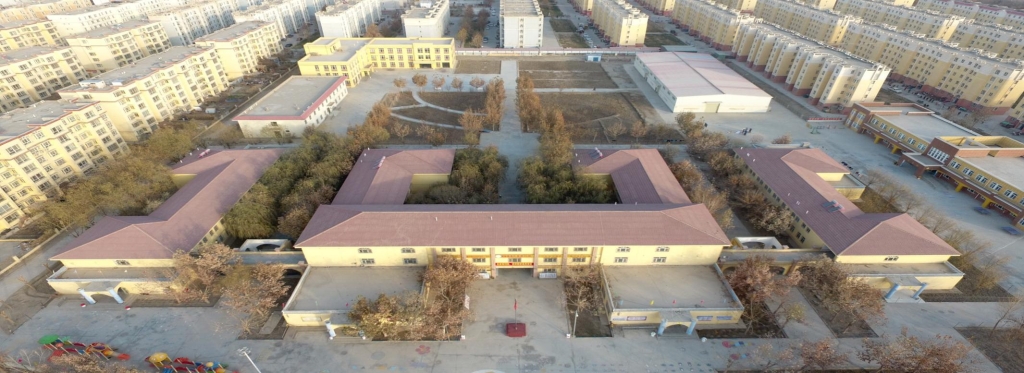
The “detention center” (geographic coordinates: 38.8367N, 77.7056E) claimed by ASPI, is actually a gerocomium in Markit County of Kashgar Prefecture, Xinjiang.
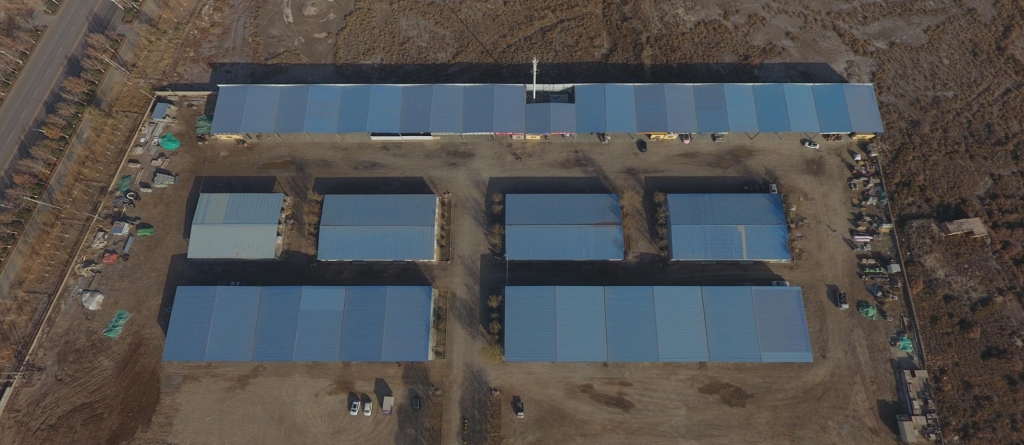
The “detention center” (geographic coordinates: 39.8252N, 78.5501E) claimed by ASPI, is actually a logistics Park in Bachu County of Kashgar Prefecture, Xinjiang.
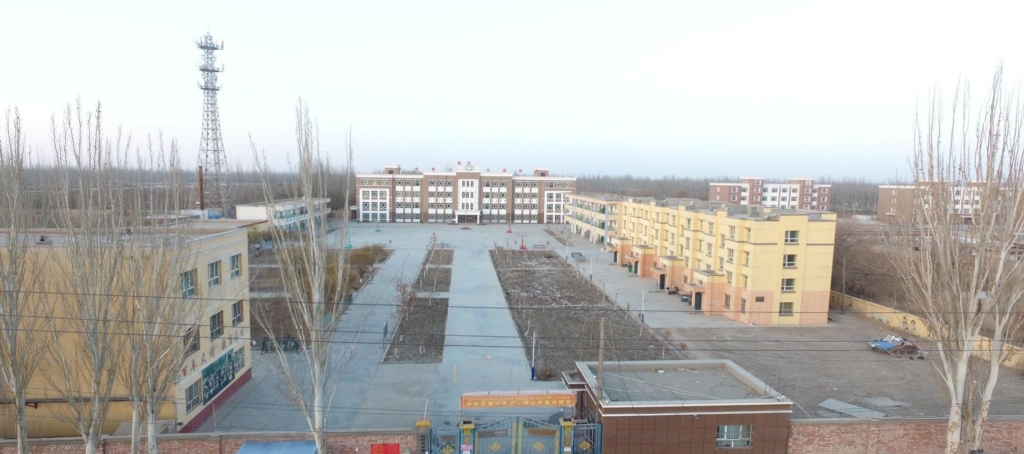
The “detention center” (geographic coordinates: 38.9950N, 77.6682E) claimed by ASPI, is actually an elementary School in Yantaq Township in Markit County of Kashgar Prefecture, Xinjiang.
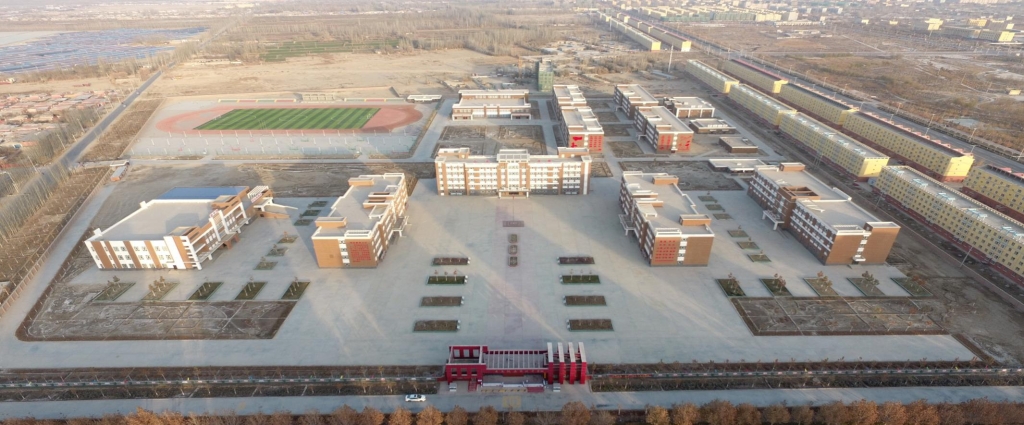
The “detention center” (geographic coordinates: 38.9046N, 77.6153E) claimed by ASPI, is actually a middle School in Markit County of Kashgar Prefecture, Xinjiang.
In reality, those so-called "independent think tanks" like ASPI are not academic research centers, but anti-China tools manipulated by the US government. Their "researches" are simply subjective fabrications filled with preconceptions and hostility. Their sources and clues were either from American anti-China non-governmental organizations, or some unverifiable and untraceable"eyewitness evidence",They even used interactive maps as satellite images, which is quite absurd, and even the Australian academic circle think their research has no academic value. The international community has also denounced such poor performance of confounding black and white and fabricating lies. I want to emphasize that Xinjiang is an open region, there is no need to learn about it through satellite images. We welcome all foreign friends with objective, unbiased stance to come to Xinjiang and to know a real Xinjiang.
As for the claim that Xinjiang is implementing a genocide policy, it is completely a false proposition and a vicious attack on Xinjiang by overseas anti-China forces. For a long period of time, Xinjiang has implemented a more favorable family planning policy for ethnic minorities including Uygurs compared with that for ethnic Han people. Let’s look at some data: from 2010 till the end of 2018, the population of ethnic minorities in Xinjiang grew from 12.9859 million to 15.8608 million, with an increase of 2.8749 million, or 22.14%; the Uygur population rose from 10.1715 million to 12.7184 million, with an increase of 2.5469 million, or 25.04%; the Han population rose from 8.8299 million to 9.0068 million, with an increase of 176,900, or 2.0%. The growth of Uygur population was two times higher than the overall Xinjiang population growth rate, which is 13.99%, also higher than that of the population growth of ethnic minorities, and significantly higher than that of the Han population. In view of these facts and data, how come the claim about "genocide"? On the contrary, in history, the US massively expelled, assimilated and slaughtered native Americans, which caused a dramatic decrease of their population from 5 million in 1492 to 250,000at the beginning of 20thcentury. Now native Americans account for only 2% of total US population. This is thorough genocide in name and in fact. The fact that western anti-China forces led by the US slandered China with the crime they had committed is a serious violation, sacrilege and manipulation of the UN "Convention on the Prevention and Punishment of the Crime of Genocide". We firmly oppose it and will never accept it.
Xu Guixiang: Thanks for your answer, Elijan Anayit. As for the second question raised by the CNN reporter, we would like to ask the Director of the Health Commission of XUAR Mutalif Roz to answer.
Mutalif Roz: in the face of the COVID-19 outbreak, Xinjiang has always upheld the principle of people and life first. Based on general requirement of fighting the virus with concerted efforts and firm conviction through scientific prevention and control, targeted countermeasures, we have strictly implemented the Law of the People’s Republic of China on the Prevention and Treatment of Infectious Diseases, adhered to "early detection, reporting, quarantine and treatment", taken targeted measures in different areas depending on the alert level, and adopted various containment measures according to law, thus curbing the coronavirus transmission to the maximum extent, guaranteeing safety of life and health of people of all ethnic groups. We have stuck to regular preventive measures cautiously from the beginning to the end, implemented monitoring early warning mechanism,and regulated fever clinics management and operation. Measures have been taken to tighten sanitary and quarantine inspection at ports, nucleic acid test of imported cold-chain food, preventive disinfection and serialization in transportation and logistics sector. We have also launched thorough cleanup campaigns to improve urban and rural environmental health management.
Virus knows no borders, and the pandemic respects no races. COVID-19 is a common enemy of all mankind. Since the outbreak of COVID-19, confirmed cases in Xinjiang involved many ethnic groups. With the support and guidance of National Health Commission, Xinjiang has treated the patients in dedicated hospitals by medical experts across the region and with all necessary resources, and coordinated multidisciplinary medical experts at national and local level. Following the latest diagnosis and treatment protocol, Xinjiang adopted timely preventive measures, tailored-policy for each patient, treatment integrating traditional Chinese medicine and western medicine along with interdisciplinary cooperation. We spared no effort to save every patient at all costs. According to relevant policies, all the confirmed and asymptomatic cases were exempted from all fees during hospitalization.
The effectiveness of epidemic prevention and control is the premise and foundation of economic and social development, which closely relates to people’s life safety and public security. Xinjiang has coordinated regular epidemic prevention and economic development, and made solid efforts in stabilizing employment, financial operations, foreign trade, foreign investment, domestic investment, and expectations and ensuring job, basic living needs, operations of market entities, food and energy security, stable industrial and supply chains, and the normal functioning of primary-level governments. With a series of favourable policies for enterprises, we have taken a number of measures to ensure employment and entrepreneurship, promote investment and consumption, and stabilize foreign trade and investment, industrial chain and supply chain, so as to resolutely minimize the pandemic’s impact on economic and social development. In the first three quarters of 2020, the gross domestic product of Xinjiang was 981.994 billion yuan, an increase of 2.2% compared to the same period, 1.5 percentage point higher than the national average level. The regional fixed asset investment (excluding that of farmers) increased by 17.3% compared to the same period, with the growth rate of 11.2 percentage points higher than that of the same period last year, and 16.5 percentage points higher than national average level. Meanwhile, Xinjiang has made consistent efforts in winning the battle of poverty alleviation and multiple preferential policies for supporting work resumption, prioritized to ensure employment of poverty-stricken labor force, preventing them from becoming poor or falling back to poverty because of COVID-19. On November 14, the last 10 impoverished counties including Shache county were lift out of poverty, signifying historical eradication of extreme poverty in Xinjiang.
Xu Guixiang: Thanks for your answer, Mutalif Roz. As for the third third question raised by the CNN reporter, we would like to ask the former trainee of the vocational education and training center in Hotan County of Hotan Prefecture Mukerem Memet to answer.
Mukerem Memet: My name is Mukerem Memet. I am a graduate from the vocational education and training center in Hotan County, Hotan Prefecture, and now I work for a company.
As you mentioned just now, some people alleged that the vocational education and training centers are “detention camps”, “the trainees are subjected to forced brainwash and labor, abuse and sexual assault”. That is not the truth. As a graduate of a vocational education and training center, I am in the best position to talk about it. We never experienced things like that, nor even heard of it. Those unsubstantiated allegations are fabricated. If we were tortured mentally and physically, how could I meet and talk with you like this today? Have you ever seen the abused people being so enthusiastic, happy and healthy? We cannot pretend to be happy.
Our center was a school with bright and spacious classrooms, a library and sports grounds. There were flowers, grass and trees on the campus in a beautiful environment. The trainees’ studies and accommodations were free of charge. We had classes from Monday to Friday, focusing on the standard spoken and written Chinese language, legal knowledge, occupational skills and knowledge of deradicalization. I learned computer technology and other skills.I realized what is right and what is wrong, and what I should and shouldn’t do. After school, we often held cultural and sports activities. I liked to play table tennis and once won a prize in a match organized by my class. Our school were well-equipped. There were TV sets, air conditioner and bathroom in each dormitory. The school respected our customs and habits. The canteen provided us with various nutritious halal meals every day for free. We went home on Saturdays and Sundays to help out the families with the chores and we could ask for a leave whenever it’s necessary. Teachers treated us like family members and our classmates helped each other like brothers and sisters. We have forged a deep friendship, staying in touch with each other up till now.
After graduating from the vocational education and training center, my parents said that I was more outgoing, thoughtful and energetic than before. They were very glad to see that. Now with the computer skills that I learned in the center, I found a satisfying job. When I got my first month’s salary, my family and I were very happy. I’m grateful to the vocational education and training center, which saved me. I am the luck one and I feel happy.
I have no relatives or friend overseas. For those who went abroad and claimed as trainees of the centers, I would like to ask you: “When did you study in the vocational education and training center ? Do you have any classmate? Your lies may deceive others, but do you think you can deceive us the same? How can you insult our school like that? All we trainees will not allow!
Xu Guixiang: Thank you for your answer, Mukerem Memet. Please go ahead to ask questions.
KBS of South Korea: Thank you, the host. I am a reporter from the KBS of South Korea, I have 2 questions.
Please give an overall introduction of the vocational education and training centers in Xinjiang. Did you go to the training center out of your own will or persuaded by others? Were you allowed to meet or talk with your family while living and studying in the center? Could you quit halfway if you were unwilling to continue the study? What kind of vocational skills have you learned and what’s your plan after graduation?
Some western countries including the U.S. alleged that “Uygur Muslims and ethic minorities in Xinjiang are suffering from human rights violations by the Chinese government,” but the Chinese government denies it. Do you know that there is such a dispute between the Western governments and the Chinese government? What is your response?
Xu Guixiang: As for your first question, we would like to ask the former trainee of the vocational education and training center in Moyu County of Hotan Prefecture Shirali Amarjan to answer.
Shirali Amarjan: My name is Shirali Amarjan. I graduated from the vocational education and training center of Moyu County, Hotan Prefecture. Now I run an interior design and decoration company. I will tell you my experience in the training center.
In the past, infected with the religious extremism, I thought the Han people were “pagans,” and we couldn’t associate with them. Muslims are not allowed to obey national laws or serve as state officials. I even regarded my wife as a heretic and often abused her only because she worked in the government. The cadres of our village committee told me that my behaviors already constituted illegal crimes which would result in serious consequences. They persuaded me to go to the vocational education and training center. My family also agreed with them after hearing what they said.
I was worried about losing freedom when I entered the training center at the beginning. However, when I got there, I found that was a school itself without any limitation on personal freedom.Trainees could go home on weekends and holidays, call their family at ordinary times, and ask for leave to attend to personal affairs at anytime. My family members also visited our study and life situations there. At the training center, not only did I study laws, standard spoken and written Chinese, but also acquired knowledge of computer science, which was my favorite major. Other vocational training skills including welding and automobile maintenance were also provided and all my classmates chose majors according to their interests. Another important thing for us is that all the courses are free of charge. With such good training opportunities, why should we quit? My classmates and I all finished our courses successfully.
After graduation, I opened an interior design and decoration company which provides packaged services including design and construction. Because I have studied computer technology in the center, I can show my customers the decorated houses on the computer. Now I have more and more clients. And my company is expanded from two people to 20 right now. Our team consists of both Uygur and Han nationalities, we get along like a big family. The skills that I have learned in the center were very useful including the standard spoken and written Chinese and laws. It is more convenient for me to conduct business talks, sign contracts and communicate with my clients. My business is developing prosperously.
Through studying in the training center, I realized that religious extremism was harmful.The government and teachers saved us. If there is no training centers, I couldn’t imagine what kind of person I would be. The vocational education and training center is an important turning point as well as new starting point of my life. My dream is to expand my business, make more money, and lead my employees to better lives.
Xu Guixiang: As for your second question, we would like to ask the former trainee of the vocational education and training center in Wensu County of Aksu Prefecture Ablajan Ablat to answer.
Ablajan Ablat: I am Ablajan Ablat, a graduate of the vocational education and training center of Wensu County, Aksu Prefecture. Now, I am the owner of an auto repair store. In my opinion, those western countries including the U.S. don’t know our real-life situations at all. They said that our human rights were violated based on their imagination, which is unreasonable.
Chasing a happy life should be the core point of human rights for ordinary people. Take myself as an example, infected with religious extremism, I participated in underground religious activities. I didn’t look for a job or work in the fields, and even asked my parents for money.My father was so worried about me that his hair turned gray and my mother often cried.My standard spoken and written Chinese has greatly improved and I have mastered auto maintenance skills through studying in the training center.I’ve realized the harmfulness of religious extremism. I opened an auto repair shop after graduation. My life is getting better with booming business and I can earn more than 10,000 yuan per month. I also work as interpreter for my boss who is of Han nationality, translating interactions in his business during autumn while my parents taking charge of my own store, to help him purchase agricultural product like corns, this job alone can make me earn about 30000 yuan each year. I got married this year. I bought a car worth of 120,000 yuan for my wife. She drives to work everyday and we live a happy life. I plan to open two more shops for chain operations next year. I want to recruit more young people to teach them auto repair technology, helping them to gain wealth as well as to expand my own business. Without the vocational skills I learned in the training center, I wouldn’t be able to have a good life.
We are very clear that our government has done a lot for us to protect our human rights. While some western countries are not really care about our human rights, instead they slandered us all around. They have sowed discord among ethnic groups with the purpose of undermining Xinjiang and making us poor, which really violated our human rights.
Xu Guixiang: Thank you.
Rossia Sygodnya of Russia: I have altogether two questions. First, I would like to ask the former trainees present at the press conference to introduce their learning experience and living conditions at the vocational education and training center.
The second question is for the Health Commission, how is the vaccine development?
Xu Guixiang: For your first question, we would like to ask the former trainee of the vocational education and training center in Hotan County of Hotan Prefecture Ablikim Dawut to answer.
Ablikim Dawut: My name is Ablikim Dawut, I am a graduate from a vocational education and training center of Hotan County, Hotan Prefecture. Now I’m working for the after-sales service department of an electrical device company. I would like to share with you my study and life at the center.
The vocational education and training center was the best school I’ve ever been to. Classrooms in the school were spacious and bright with multimedia teaching equipment for the sake of our study. We had six classes everyday from Monday to Friday, focusing on national common language, legal knowledge, occupational skills and extremism eradication content. The regulations, curriculum, and menus at school all used standard Chinese as well as Uygur language. We had a colorful life in our spare time. Activities like basketball games, volleyball games and art shows were often held. Our dormitories were equipped with TV, air conditioners and bathing facilities. The school respected our customs. Every day our canteen provided us with halal meals for free, such as noodles with stir fried vegetables, pilaf, stewed mutton, and thin crust steamed buns. The medical facilities were available 24-hours, minor ailments like headache or cold can be treated here. We also had regular physical examinations. We got rest on weekends and holidays. When we came back home, it was out of our free will to decide whether to take part in legal religious activities or not. No one has ever interfered in.
After graduation, a friend introduced me to work at an electrical company with the skills I’ve learned at the center.I signed the employment contract with the company. My monthly income was more than 5,000 yuan and the highest I’ve ever earned was more than 20,000 yuan. My boss thinks highly of me because I am now the backbone of the company. I am very proud that the boss will arrange me to solve problems which others cannot done. I will work harder to win the honorary title of “excellent staff” by the end of the year. When I become the group leader of our department,I will get higher pay, and provide a better life for my families.
Xu Guixiang: Thank you for your answer, Ablikim Dawut. Also thanks for questions from the foreign media. Regarding the second question from the Rossia Sygodnya, the Director of the Health Commission has already answered, and there were also relevant answers at the previous epidemic news conference.
Next, we invite reporter friends present to ask questions.
CGTN: Thank you, the host. I am a reporter from the CGTN. I would like to ask the graduates how did they infected with the religious extremism? What do they think of the religious extremism now? How about their present lives?
Xu Guixiang: This question goes to the former trainee of the vocational education and training center in Shanshan County of Turpan City Aysham Rasul.
Aysham Rasul: My name is Aysham Rasul and I live in Xiaodonghu Village, Pizhan Town, Shanshan County, Turpan City. After graduating from the training center, I opened a beauty and health care store in Shanshan County and my business is booming with a monthly income of 8,000 yuan to 10,000 yuan. What makes me happy is not the substantial income, but the fact that I bring beauty to everyone around me. It was my childhood dream but I took a detour to realize it.
In the past, my legal awareness was weak and I lacked the ability to distinguish between right and wrong. Influenced by extremist ideas, I had many misconceptions. At that time, I thought that women who wore fashionable clothes were against religious doctrine; women who were not masked were “pagans” and should go to hell; women were not allowed to wear wedding dresses at weddings, nor were they allowed to express their joy through singing and dancing, as well as express their grief through crying at funerals. Thus I did not associate with women who were not masked, nor did I allow my family to associate with them, and I even found fault with them. I also had the misconception that my original beauty and make-up store was not a legitimate business. I stopped running the store and spent all my time indulging in underground religious activities and I was on the verge of divorce with my husband.
Persuaded by my husband, I came to the training center. The days spent at the center were pleasant and unforgettable. The environment was clean and tidy with good teaching facilities, free accommodation and amenities. We got reimbursement for medical treatment through the medical insurances. Teachers taught us knowledge and skills patiently and I learned professional skills in beauty and hairdressing. Through the training, I realized that my past beliefs were completely wrong and religious extremism was our enemy. It’s a disease which poison our body and a drug which lead us to death. I must stay away from religious extremism and lead a normal life.
After graduating from the vocational education training center, I had the idea of opening a beauty and health care salon. When the village committee learned of my plan, they actively helped me to contact the supplier of beauty equipment and introduce customers.I became more confident. In 2019, my beauty salon was successfully opened. At the very beginning, village cadres introduced a lot of customers to me. Since then, I had more and more customers. Many newly married couples in the village came to my salon for makeup, and many people from the county came for beauty services. One year later, I got a subsidized loan of 50,000 yuan. I purchased some health-care equipment and trained five apprentices.
I’ve always been thinking about whom should I be thankful for my today’s happiness. I am pretty sure that I should thank the vocational education training center,which helped me sharpen my eyes, distinguished right from wrong, and earn money through my own business. I should thank my husband as well for saving our family and encouraging me to attend the training center.
I heard that some overseas people saying us Uygurs are living in extreme misery with no human rights or freedom. When I heard these expressions, I was very angry. I want to tell them we are happy living in Xinjiang as a big family. We get loans to start business and subsidies to build houses. For example, my family received 28,500 yuan subsidies.Our children enjoy free education and all my family members have medical insurances. Now, Xinjiang is harmony and stable which attracts more tourists. We have more ways to earn money. The grapes and cantaloupes we planted are sold both at home and abroad. With bulging wallets, we could travel around the world. These are all significant changes. We welcome all the overseas friends to visit Xinjiang, to experience the tremendous changes that have happened over the years and to feel our happy life.
Xu Guixiang: Thank you for your answer, Aysham Rasul. Please go ahead to ask questions.
CNS: Thank you, the host. I am a reporter from the CNS. Some foreign media outlets and personnel said that the female trainees at the training center were forcibly injected with unknown drugs or have IUDs, and forced sterilization. When joining the training center, some women got their hair cut short or been shaved. It is said that some wigs were made from the hair of the female trainees. Is that true?
Xu Guixiang: This question goes to the former trainee of the vocational education and training center in Yutian County of Hotan Prefecture Amina Mattursun.
Amina Mattursun: My name is Amina Mattursun. I am a graduate of the training center in Yutian County, Hotan Prefecture and I work in a company at present.
The so-called“forced sterilization” claimed by those overseas agencies and persons is totally nonsense. We lived happily with a sound learning environment in the center. Those ridiculous events never happened. After graduation,many of us got married and had children. Take myself for example, I have two children- one son and one daughter, both of them attend our village school.My husband and I plan to have another child in one or two years when we have better conditions. How can we have another child if I was forcibly sterilized in the training center?
As for the allegation that “female trainees were forced to have their heads shaved”, it is a sheer slander. I’ve never been forced to cut my hair, nor any of my female classmates. I like dancing and singing and I am a beauty lover. When I was in the center, I used to dress up and participate in the cultural activities with my classmates. I could not image how ugly it would be if we got our hair shaved,not to mention how could we participate in those activities. After graduation, when I go to parties and weddings, I always braid my long hair and wear a traditional embroidered hat and dresses made of Adles, which is a kind of cloth made by Uygur people. I always have a good time singing and dancing with everyone.
There is a local saying goes like “You can’t serve tricks to the locals”. These rumors and lies about the training centers are ridiculous and absurd. We were enraged and we really want to know their purpose. They should be ashamed about their words, deeds, bias.
Xu Guixiang: Just now, the former trainees present at today’s press conference shared with us their life experiences and living conditions.
Today's press conference concludes now. Thanks all the invitees and media friends.


